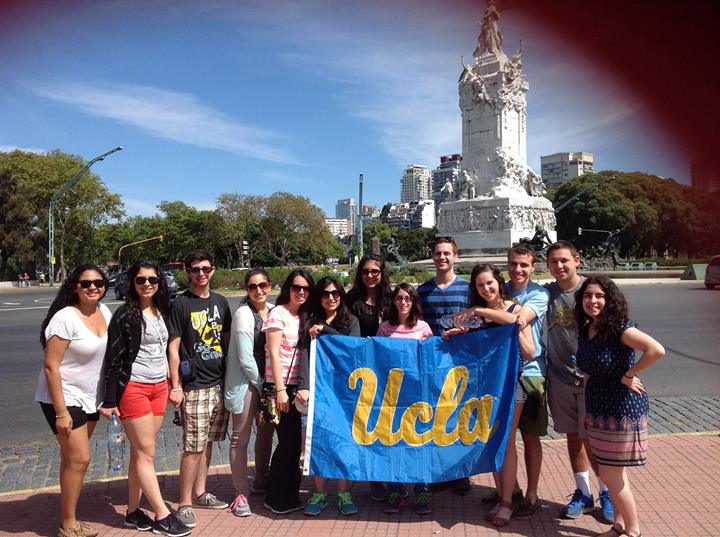Over spring break, dozens of UCLA students chose to travel to Buenos Aires, Oklahoma, or Southern California in order to participate in one of three alternative spring break programs, organized through Hillel at UCLA. According to the Hillel website, the goal of the trips is to “provide students with an opportunity to build community, learn about social justice, and volunteer locally and around the world, all through a Jewish point of view.” In addition, the trips help Jewish Bruins build lasting relationships within the Bruin community and with the communities that they serve.
Naomi Karp, the director of student life at Hillel, was the primary staff member involved in organizing the three different trips. “Planning for Hillel ASB begins way back in the spring of the year before the trip. We get feedback from students about where they would like to go, and begin the process of applying to the various trips provided through Hillel International and other organizations. The great thing about most ASB trips is that we [work] through an organization that plans most of the program, including itinerary, service, and education. We at Hillel at UCLA get to provide input and feedback about what Jewish Bruins will want at a particular site, but don’t have to do much of that coordination. Our focus is on recruiting students to come with us, planning the logistics of getting everyone there, creating a cohesive ASB group, and providing additional Jewish content and reflection.”
Once the group is selected, participants meet together several times before the trip in order to get better acquainted with one another, discuss the Jewish aspects of volunteer work, and learn more about the specifics of each assignment. There are also debriefing sessions once the groups have returned from their adventures.
This year, students could choose between participating in groups doing service work in Buenos Aires, Oklahoma, or Southern California.
____________________________________________
The Trips:
Buenos Aires, Argentina:
The Hillel at UCLA Alternative Spring Break experience in Buenos Aires worked with Hillel Buenos Aires to improve quality of life for children living in the city’s many slums. The experience immersed the participant in the local culture through intensive work with individuals in the slums as well as cultural programming across Buenos Aires.
Oklahoma:
The Jewish Disaster Response Corps works with Hillels and other student groups to mobilize students to participate in an alternative break trip to help those affected by disaster during their vacations. Through this effort, the JDRC has mobilized over 500 students to provide a week of service to domestic communities affected by disaster. The JDRC volunteers participate in week-long Jewish service-learning trips that combine hands-on service in response to natural disasters with structured Jewish learning and reflection. The JDRC was on the ground two weeks after the first EF-5 tornado hit Central Oklahoma in May 2013, removing debris and cutting down trees. The JDRC is committed to bringing over 100 students to help in the long-term recovery efforts in 2014.
Southern California:
Students and Holocaust survivors gathered for a week-long retreat during Righteous Conversation, Righteous Action, to dialogue with each other about the survivors’ personal narratives and the implications of survivors’ stories for our contemporary world. Students and survivors discussed their common hopes for a better world and students worked together to create media (short films and PSAs) about the issues that concern them in their own community, specifically issues of human dignity and justice that exist on campus. Training was facilitated by the Righteous Conversations Project and Jewish World Watch. This alternative break was also supported in part by Repair the World.
____________________________________________
Participant Perspectives:
“On [one] Friday night, Samara Hutman, the executive director of LA Museum of the Holocaust, asked us all at the table to talk about our grandparents and our family histories. Each story gave me greater appreciation for how this particular diverse group of people was able to come together that week: UCLA sophomore Sepideh Parhami’s grandparents survived persecution in Iran; Israeli Fellow at Hillel Yair’s grandparents immigrated to Israel from Eastern Europe and Northern Africa; Camp Max Straus employee LaMont’s grandparents went to high school in Indiana but struggled against racial discrimination in this country; Holocaust survivor Eva Nathanson’s grandfather was a member of the Underground Railroad whose mission was to save Hungarian and Czechoslovakian Jews. Hearing these stories and telling my own grandparents’ showed the power of oral history to honor those that enabled us to all be there that night, sharing a Shabbat dinner in safety and comfort. This was a large part of why we were there: to honor the harrowing experiences of our collective past and take advantage of our ability to effect positive change for our present and future.”
— Marnina Wirtschafter, 3rd year Communication Studies major (Filmmaking with Holocaust Survivors in Southern California)
“With all the news that circulates around natural disasters, it’s easy to feel bad for a moment and then become desensitized by all that you see on television. By going on the trip, I was hoping to correct that lack of empathy — or at least inaction. I wanted to, at the very least, learn more about tornadoes and the impact they have on those living in Oklahoma.”
— Yael Glouberman, 2nd year Communication Studies major (Jewish Disaster Response Corps in Oklahoma)
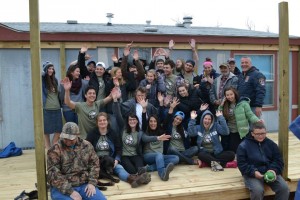
“This trip raised my awareness of devastation occurring from natural disasters across the United States, as well as the world. I hope to continue service work in the future, but a short-term goal that I decided to make after my return from Alternative Spring Break is to stay aware of and research events occurring around the world at least once a week. It is easy to get caught up in the Westwood bubble, and pay attention only to what is occurring around you. For me, this trip prompted a realization that it is important to be informed of world events and conscientious of what actions you can take to help.”
— Rebecca Lerman, 3rd year Psychobiology major (Jewish Disaster Response Corps in Oklahoma)
“We spent a day [in Buenos Aires] working with adults who have
special needs. What I found interesting was that it was difficult to
communicate with them, not because of their disability, but because of the
language barrier. Then we started a dance workshop and we were all on the same
level. It was as if dancing was a universal language we could connect with
together.”
— Tammy Rubin, 3rd year Human Biology and Society major (Hillel of Argentina)
“One of most powerful moments was when we visited a community just off the highway — the road’s end — and it is a road of mud. The houses are made of the scraps that they can find around. We went to the school and painted it, played with some of the kids, helped distribute food to people who were malnourished, and also taught them proper nutrition. It was really powerful to see. In LA, you can go 20 minutes that way and run into skid row. On skid row, people are homeless. In Buenos Aires, these people all have homes, but they also have seven kids and keep having more, even though can’t afford anything. They kept saying that this was the second world, something in between the first and third worlds.”
— Elan Kramer, 2nd year Theatre major (Hillel of Argentina)
“The most powerful moment for me was when Nicki, a teacher from Plaza Towers Elementary School in Moore, Oklahoma, shared with our group her experience in the Moore Tornado on May 20, 2013. We had been working on a home for two days at that time, and the idea of tornado relief was still a little theoretical — we knew we were rebuilding and why, but it did not yet seem personal. Over the course of an hour, Nicki opened up and shared some of the most horrific moments of her life — her school lost seven children that day in the tornado, and Nicki, single-handedly, saved three children and kept them safe through the tornado. Nicki’s story personalized the experience for me, and also gave me a new insight into the meaning and significance of everyday heroism. Not only was Nicki heroic in that she saved her students’ lives that day, but she is heroic every day that she walks back into the classroom and acts as a role model for students, and was heroic that night when she sat in a room of strangers and shared her experience and its impact on her and her community.”
— Naomi Karp, Director of Student Life at Hillel at UCLA (Jewish Disaster Response Corps in Oklahoma)
“I found myself questioning my purpose on the
trip and the idea of voluntourism. I realized that the work, whatever work it
is, for only a week won’t change the world which was disheartening. But that
doesn’t mean it does change someone’s day or change the individual who’s doing
the service with personal growth. That’s what it’s all about.”
— Tammy Rubin
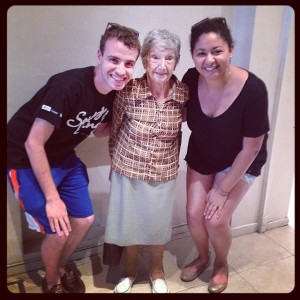
“I think that the big thing I learned from this trip had to do with the impact a conversation can make, because we did talk a lot about being a tourist to build houses in a foreign country. But the impact we made was great — even just putting a smile on someone’s face. I won’t forget for the rest of my life Dolores, the woman I met eating lunch. We’re all just human. So what if I’m not Argentinian or going back for a long time. I still had an impact on someone and they still had an impact act on me.”
— Elan Kramer
“I know this was probably naive but because tornadoes are the focus of so many broadcasts, it’s easy to forget that these aren’t the problems that people in Oklahoma face, they’re just one of many. When we spent the week with Mr. Perry, the man whose house we were helping rebuild, we learned a lot about him as an individual. His health, his family, his culture. It’s easy for that to get lost in the mix if you just send a check to help those affected or don’t have conversations with actual people.”
— Yael Glouberman
“I learned that where you go isn’t what makes a trip unforgettable. Sure, Cabo and Miami might offer sandy beaches and nightclubs, but they’ll never compare with Fuzzy’s taco shop or the amazing people I wouldn’t have met had I not embarked on this ASB trip. […] We had UCLA students, Chicago students, our group leaders were from New York, and our hosts were from Oklahoma; yet while we all came from diverse backgrounds, we became a close-knit group during this one week and worked together to accomplish an impactful project.”
— Julia Feygelman, 2nd year Psychobiology major and French minor (Jewish Disaster Response Corps in Oklahoma)
“This trip gave me a great appreciation to learn about other communities and do everything I can to help those in need especially by just showing how much I care. I really hope that I can participate in more service learning trips in the future!”
— Naomi Esserman, 2nd year Electrical Engineering major (Jewish Disaster Response Corps in Oklahoma)
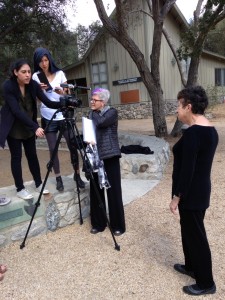
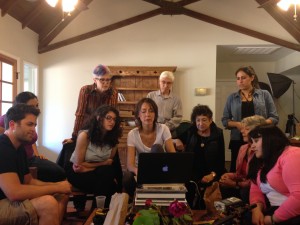
“The main take-away was that it’s easy to feel overwhelmed by violence and injustice in the world, but I have no excuse to stand idly by because there are actions I can take to make a difference.”
— Marnina Wirtschafter
____________________________________________
As Karp stated, “The location and volunteer
work changes from year to year, but we are committed to providing students with
opportunities to travel and learn about Jewish communities across the country
and around the world, while strengthening their commitment to tzedek (social
justice) and tikkun olam (repairing the world). As long as students care about
these things, we will continue to provide these trips.”

